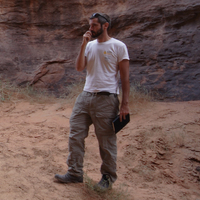Stefano Biagetti
Pompeu Fabra University, Humanities, Department Member
In the 12,000 years preceding the Industrial Revolution, human activities led to significant changes in land cover, plant and animal distributions, surface hydrology, and biochemical cycles. Earth system models suggest that this... more
In the 12,000 years preceding the Industrial Revolution, human activities led to significant changes in land cover, plant and animal distributions, surface hydrology, and biochemical cycles. Earth system models suggest that this anthropogenic land cover change influenced regional and global climate. However, the representation of past land use in earth system models is currently oversimplified. As a result, there are large uncertainties in the current understanding of the past and current state of the earth system. In order to improve representation of the variety and scale of impacts that past land use had on the earth system, a global effort is underway to aggregate and synthesize archaeological and historical evidence of land use systems. Here we present a simple, hierarchical classification of land use systems designed to be used with archaeological and historical data at a global scale and a schema of codes that identify land use practices common to a range of systems, both implemented in a geospatial database. The classification scheme and database resulted from an extensive process of consultation with researchers worldwide. Our scheme is designed to deliver consistent, empirically robust data for the improvement of land use models, while simultaneously allowing for a comparative, detailed mapping of land use relevant to the needs of historical scholars. To illustrate the benefits of the classification scheme and methods for mapping historical land use, we apply it to Mesopotamia and Arabia at 6 kya (c. 4000 BCE). The scheme will be used to describe land use by the Past Global Changes (PAGES) LandCover6k working group, an international project comprised of archaeologists, historians, geographers, paleoecologists, and modelers. Beyond this, the scheme has a wide utility for creating a common language between research and policy communities, linking archaeologists with climate modelers, biodiversity conservation workers and initiatives.
The study of Land Use and Land Cover (LULC) in Holocene Africa has been geographically and temporally unbalanced, particularly with regard to the integration of archaeological data into the reconstruction of past land use. Past African... more
The study of Land Use and Land Cover (LULC) in Holocene Africa has been geographically and temporally unbalanced, particularly with regard to the integration of archaeological data into the reconstruction of past land use. Past African dynamics have often worked on a very large scale, and changes in LULC are extremely significant to the study of the development of cultural trajectories on a truly continental perspective. In this session we will gather experts from different regions of Africa with the aim of discussing possible directions for research on LULC in Africa, with a special focus on the regions that have not yet been the subject of land use studies. This session will also explore the viability of integrating new methods, perspectives on the relevance and future application of these studies, and the many data challenges present in the archaeological record.
